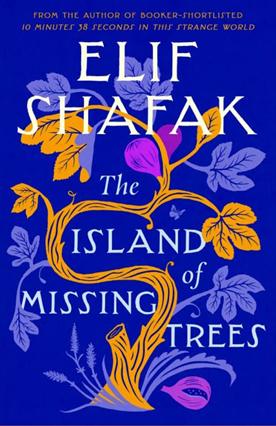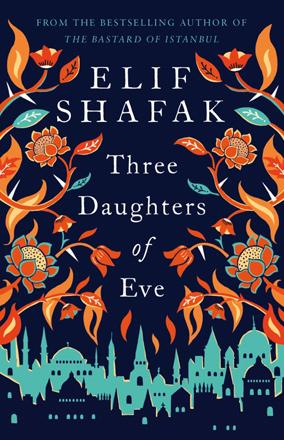You are here
‘The absence of trees was a powerful rebuke’
By Sally Bland - Jan 09,2022 - Last updated at Jan 09,2022

The Island of Missing Trees
Elif Shafak
UK: Viking/Penguin Random House, 2021
Pp. 354
In her latest novel, “The Island of Missing Trees”, Elif Shafak skilfully intertwines some of the burning issues of our time — immigration, exile, hate crimes, war, climate change, and humans’ relationship to nature, with the fall-out from the Cyprus conflict. Two touching, long-lasting love stories contrast sharply with gruesome instances of hate-fuelled violence that reached a peak in Cyprus in 1974.
Far from being a dry, chronological account, the novel centres on the human impact — how the conflict changed the course of people’s lives, reworked their feelings and memories. Shafak’s narrative hovers over the boundary between realistic fiction and fantasy, incorporating legends alongside credible events, for, in her words, “legends are there to tell us what history has forgotten”. (p. 1)
Shafak’s writing has always targeted social boundaries, stereotypes, prejudice and preconceptions, but “The Island of Missing Trees” goes further than ever before — questioning the boundaries between not only humans, in this case, Greek and Turkish Cypriots, but between humans and the plant world. Part of the story is told by a fig tree and tree-related metaphors permeate the narrative. As Shafak’s vibrant descriptions of Cyprus’s natural beauty and human behaviour show, “There are many things that a border… cannot prevent from crossing.” (p. 3)
“The Island of the Missing Trees” tells the love story of two young people who share a humanist and scientific outlook: Kostas, a Christian Greek Cypriot, who becomes an evolutionary ecologist and botanist, and Defne, a Muslim Turkish Cypriot, who becomes an archaeologist. Their chosen professions are not random but point to major themes in the novel. They fall in love in their teens but keep it secret, knowing that their families will not approve of their crossing the ethnic and religious divide. “You don’t fall in love in the midst of a civil war, when you are hemmed in by carnage and by hatred on all sides. You run away as fast as your legs can carry your fears… And yet there they were, the two of them.” (p. 168)
As the conflict intensifies, Kostas’s mother sends him to live with his uncle in England; he doesn’t see Defne for 25 years. Finally reuniting and settling in Britain, they try to shield their daughter, whom they name Ada, which means island in Turkish, by not telling her about their past lives, their families and how they were torn apart by the conflict. Still, grief from the past haunts them and is unwittingly passed on to Ada. As the novel opens, Ada is sixteen and troubled by the missing links in her background. “So many times in the past she had suspected that she carried within a sadness that was not quite her own.” (p. 18)
The unfolding of the plot shows that trauma cannot be hidden or put aside; it is passed down, however unintentionally, and must be dealt with in order for people to lead happy, rewarding lives. The same goes for family ties and the past.
A female fig tree, taken by Kostas from Cyprus to Britain, has her own poignant voice. In her dedicated chapters, she relates the experience of exile in both its tragic and comic dimensions. Indeed, the tree symbolises the immigrant as she explains that despite all of Kostas’s care, she would need seven years to bear fruits again. “Because that is what migrations and relocations do to us: when you leave home for unknown shores, you don’t simply carry on as before; a part of you dies inside so that another part can start all over again.” (p. 55)
Trees also indicate the health and viability of a society or country. When Kostas returned to Cyprus to search for Defne, “He was saddened to see that this part of the island was not the verdant paradise he remembered… The absence of trees was a powerful rebuke to the mistakes of the past.” (p. 198)
The author’s Turkish origins make her choice of subject matter particularly significant. She doesn’t take sides in the conflict but sides with love and peace as opposed to hate and war. The emphasis on the plant world and giving the fig tree a voice is not random but integral to the novel’s message of learning from nature and respecting all living things: “Even trees of different species show solidarity with one another regardless of their differences, which is more than you can say for so many humans.” (p. 100)
Shafak’s novels are always well-written, but this one is exceptionally so, rich in fascinating details about human history and nature, reflections on grief, justice and guilt, and an intriguing storyline that is hard to anticipate. It is a novel with international dimensions, comparing the victims of the Cyprus conflict to those of Pinochet’s dictatorship in Chile, of the Spanish civil war, and of massacres in Yugoslavia, Cambodia, Rwanda and Iraq. “The Island of the Missing Trees” is available at Books@cafe.
Related Articles
10 Minutes 38 Seconds in This Strange WorldElif ShafakLondon: Viking/Penguin Random House: 2019Pp.
The Architect’s ApprenticeElif ShafakNew York: Penguin Books, 2014Pp.
Three Daughters of EveElif ShafakUK: Viking/Penguin Random House, 2016Pp.


















